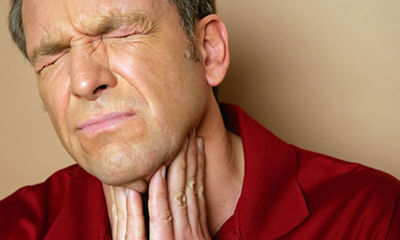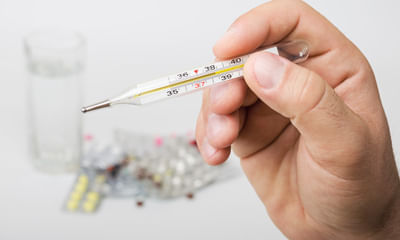Dry Cough Leading To Vomiting
Severe headache, since 3 years (on and off, mostly originating in the back of head or sometimes variable origin and spre ...
Ask Free Question
Anaemia always leads to the symptoms of being tired and also having pain in the joints. You can do hot water steaming to reduce the headache which might be due to sinusitis.
I am having throat infection from last 2 years. In which when I speak more and when I go to sleep my throat suddenly cho ...
Ask Free Question
There is only one main condition which leads to dryness of the mouth, this is lack of protective layer of the mouth, which is mucus, this mucus layer is basic protective layer of the mouth, this can be regained by iron rich diet, to got less of mouth infection get it enhanced.
I am 17 year old my name is aman. Can you tell me what are the symptoms of flu Can I get solution for pimples. ...
Ask Free Question
There are three types of flu virus. Type A viruses cause most cases of human flu and some disease in animals. Type B are less common and cause less severe illness. Type C viruses usually only cause mild flu and are rare. Symptoms of flu tend to be more serious than those of the common cold and can include: Sudden fever (usually 39°C or above, Dry cough, Achy muscles, Headache, Sore throat, Extreme tiredness, Runny or blocked nose, Nausea, vomiting and diarrhoea (more common in children) Acne or pimples is a chronic disease involving the pilosebaceous follicles. Sebaceous glands are found most abundantly on the face and scalp, though they are present on every part of the skin except the palms of the hands and soles of the feet. Though the sebaceous gland is a mini organ, it is anatomically and functionally related to the hair follicle. Cutaneous disorders attributed to the sebaceous gland are really disorders of the entire pilosebaceous unit. The areas most commonly involved in acne are the face, upper chest, and back. Other less common areas include the upper arms, buttocks, and upper thighs. Acne arises from the interaction of 4 factors 1. Excess sebum production caused by androgenic stimulation of sebaceous glands; 2. Outlet obstruction of the sebaceous follicle arising from excess production of keratinocytes (the basic cell of the epidermis); 3. Increased proliferation of the bacteriaPropionibacterium acnes that normally live in the sebaceous follicle; and 4. Inflammation caused by sebum escaping into the surrounding skin. Excessive manipulation by the patient, causing the primary lesions to disappear and leaving excoriated, raw-looking marks. This is called acne excoriée and can cause scar formation. For removal of black marks you can apply pure coconut oil daily before sleeping, don't apply while going out in sun together with this constitutional homoeopathic treatment will give you best results.
How to improve immune system and what are the symptoms of malaria and what will be good diet for a person suffering from ...
Ask Free Question
Hello, We all get exposed to the same environment, but all of us doesn't get affected by it! Why - because of different immune system. So, if a person has a strong immune system, we are protected from the attack of any virus or bacteria! A healthy, nutritious and balanced diet along with exercise will give you that. A healthy and strong immune system prevents us getting any diseases even a simple cough and cold. So, to build up a strong immunity, you need to alter few changes in your daily routine. If you don't have any underlying medical condition, you can follow the below points for healthy living. The diet plays an important role in making our immune system stronger: 1. Get enough protein. You can get protein from meat, dairy, eggs and vegetables. 2. Avoid saturated fats, but eat plenty of unsaturated fats. These" good fats" are found in corn, sesame, safflower, soybean, and cottonseed oils. 3. Eat limited amounts of carbohydrates. Consuming appropriate amounts of wheat, corn, and cereals helps to create the energy required for the body to produce white blood cells. 4. There are a number of particular foods that can help to boost-up your immunity. These include: Garlic, Almonds, Kale, Navy beans, Reishi mushrooms, Blueberries and raspberries, Yogurt, Green, Matcha, and Tulsi teas. 4. Eat antioxidants. Antioxidants are vitamins, minerals, and other nutrients that help repair damaged cells in the body. Examples of antioxidants are Beta Carotene (apricots, broccoli, beets, spinach, green peppers, tomatoes, corn, and carrots), Vitamins C (berries, broccoli, nectarines, oranges, strawberries, bell peppers, tomatoes, and cauliflower) and E (broccoli, carrots, nuts, papaya, spinach, and sunflower seeds), Zinc (oysters, red meat, beans, nuts, and seafood), and Selenium. 5. Vitamin A is also an antioxidant, and helps your immune system to function more efficiently. In addition to supplements, you can get vitamin A from carrots, tomatoes, chilis, and squash. 6. Echinacea, ginseng, aloe vera, and green tea are all said to boost your white blood cell count. 7. Exercise regularly. Getting enough exercise improves your cardiovascular health, and greatly reduces the likelihood of certain chronic diseases. Exercise increases the flow of blood through different parts of the body, and it increases the body's excretion of harmful metabolites, helping your immune system function properly. So run, bike, swim, walk -- whatever gets you moving! 8. Stop smoking and Limit alcohol consumption. 9. You should drink 8 glasses of water every day. 10. Sufficient deep sleep also helps the cells replenish and regenerate and is therefore necessary if you want to maintain a healthy immune system. Medication: Take Schwabe’s Alpha-WD/ twice daily for 1month. Symptoms of malaria; Malaria is an acute febrile illness. In a non-immune individual, symptoms appear 7 days or more (usually 10–15 days) after the infective mosquito bite. The first symptoms – fever, headache, chills and vomiting – may be mild and difficult to recognize as malaria. If not treated within 24 hours, P. Falciparum malaria can progress to severe illness, often leading to death. Diet for typhoid: Typhoid results in gastrointestinal conditions and so it is important to follow a diet that contains foods that are easy to digest. Slightly overcooked rice along with yogurt should be included in a diet for typhoid patients as rice contains a small amount of fiber that helps to regulate the digestive system while yogurt contains healthy cultures that reduce the severity of stomach flu. Avoid milk as it is tougher to digest and is likely to aggravate diarrhea. Juices and carbohydrate rich items such as steamed fruits are very important. Homemade vegetable soups with no additional spices. Buttermilk and softened soda crackers are good options while bland rice pudding, porridge, and custard are also good typhoid foods. Foods to be avoided: Avoid high fiber foods like whole grains and raw vegetables as these can place additional stress on your digestive system. When you have typhoid, foods to avoid also include vegetables like cabbage, capsicum and turnip as these can cause bloating and gas. Avoid all spices as far as possibly, especially hot seasonings such as pepper, Cayenne and chili powder. Include yogurt and eggs as they are easier to digest. Vegetarians can start to include lentils, legumes and even cottage cheese, in their diet.
What are the symptoms of malaria, what are the symptoms of dengue fever, what are the symptoms of flu what shall I do. ...
Ask Free Question
Hello, Malaria is an acute febrile illness. In a non-immune individual, symptoms appear 7 days or more (usually 10–15 days) after the infective mosquito bite. The first symptoms – fever, headache, chills and vomiting – may be mild and difficult to recognize as malaria. If not treated within 24 hours, P. falciparum malaria can progress to severe illness, often leading to death. Children with severe malaria frequently develop 1 or more of the following symptoms: severe anaemia, respiratory distress in relation to metabolic acidosis, or cerebral malaria. In adults, multi-organ involvement is also frequent. In malaria endemic areas, people may develop partial immunity, allowing asymptomatic infections to occur. Dengue: Dengue fever, also known as breakbone fever, is a mosquito-borne tropical disease caused by the dengue virus. Symptoms include fever, headache, muscle and joint pains, and a characteristic skin rash that is similar to measles. In a small proportion of cases, the disease develops into the life-threatening dengue hemorrhagic fever, resulting in bleeding, low levels of blood platelets and blood plasma leakage, or into dengue shock syndrome, where dangerously low blood pressure occurs. Flu or Influenza: Symptoms of influenza can start quite suddenly one to two days after infection. Usually the first symptoms are chills or a chilly sensation, but fever is also common early in the infection, with body temperatures ranging from 38 to 39 °C (approximately 100 to 103 °F). Many people are so ill that they are confined to bed for several days, with aches and pains throughout their bodies, which are worse in their backs and legs. Symptoms of influenza may include: Fever and extreme coldness (chills shivering, shaking (rigor)) Cough Nasal congestion Runny nose Sneezing Body aches, especially joints and throat Fatigue Headache Irritated, watering eyes Reddened eyes, skin (especially face), mouth, throat and nose Petechial rash In children, gastrointestinal symptoms such as diarrhea and abdominal pain, (may be severe in children with influenza B).
I m 27 years, I m pregnant for the first time I suffering from cold and cough which leading to vomiting n doctors advise ...
Ask Free Question
U can start with homeopathy pills hepar. Sulph 30 twice day for 5days homeopathy pills safe during pregnancy.
When I have my lunch, dinner or brkfst just after my food I keep on coughing continously for 2 to 5 mins and sometime I ...
Ask Free Question
Hi , you might be eating in a jiffy. Sit down be calm and eat peacefully. If you eat hurriedly, the food enters the wind pipe instead of the food pipe which ultimately leads to coughing.
My son is 7 years old ad he weighs around 24 kg. Since birth his immunity is low and very frequently he gets cold, cough ...
Ask Free Question
Modify diet eg. Give green leafy vegetables, turmeric powder in milk, honey with tulsi leaf, fresh fruit, dates. Avoid chocolates, ice cream, biscuits, artificial flavoured food, packet food, junk food. Start syrup. Septilin 5ml two times a day regularly for one to three month if other investigation reports are normal.






